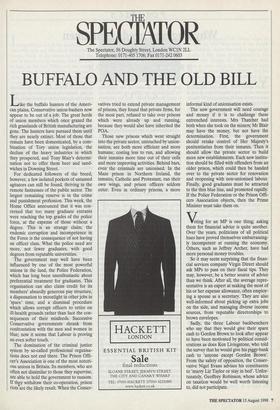SPECIATOR
The Spectator, 56 Doughty Street, London WC1N 2LL Telephone: 0171-405 1706; Fax 0171-242 0603
BUFFALO AND THE OLD BILL
Like the buffalo hunters of the Ameri- can plains, Conservative union-bashers now appear to be out of a job. The great herds of union members which once grazed the rich grasslands of British manufacturing are gone. The hunters have pursued them until they are nearly extinct. Most of those that remain have been domesticated, by a com- bination of Tory union legislation, the decline of the heavy industries in which they prospered, and Tony Blair's determi- nation not to offer them beer and sand- wiches in Downing Street.
For dedicated followers of the breed, however, a few isolated pockets of untamed agitators can still be found, thriving in the remote fastnesses of the public sector. The largest remaining reserve is in the crime and punishment profession. This week, the Home Office announced that it was con- cerned that too many graduate entrants were reaching the top grades of the police force, at the expense of those without a degree. This is an strange claim; the endemic corruption and incompetence in the Force is the consequence of not having an officer class. What the police need are more, not fewer graduates, with good degrees from reputable universities.
The government may well have been influenced by one of the most powerful unions in the land, the Police Federation, which has long been unenthusiastic about preferential treatment for graduates. This organisation can also claim credit for its members' absurdly generous pay structure, a dispensation to moonlight in other jobs in `spare' time, and a dismissal procedure which allows corrupt officers to retire on ill-health grounds rather than face the con- sequences of their misdeeds. Successive Conservative governments shrank from confrontation with the men and women in blue; now it seems that Labour is proving an even softer touch.
The domination of the criminal justice system by so-called professional organisa- tions does not end there. The Prison Offi- cer's Association is one of the most notori- ous unions in Britain. Its members, who are often not dissimilar to those they supervise, are able to hold the government to ransom. If they withdraw their co-operation, prison riots are the likely result. When the Conser-
vatives tried to extend private management of prisons, they found that private firms, for the most part, refused to take over prisons which were already up and running, because they would also have inherited the POA.
Those new prisons which went straight into the private sector, untouched by union- isation, are both more efficient and more humane, costing less to run, and allowing their inmates more time out of their cells and more improving activities. Behind bars, even' the criminals are unionised. In the Maze prison in Northern Ireland, the inmates, Catholic and Protestant, run their own wings, and prison officers seldom enter. Even in ordinary prisons, a more informal kind of unionisation exists.
The new government will need courage and money if it is to challenge these entrenched interests. Mrs Thatcher had both when she took on the miners; Mr Blair may have the money, but not have the determination. First, the government should retake control of Her Majesty's penitentiaries from their inmates. Then it should allow the private sector to build more new establishments. Each new institu- tion should be filled with offenders from an older prison, which could then be handed over to the private sector for renovation and reopening with non-unionised labour. Finally, good graduates must be attracted to the thin blue line, and promoted rapidly. If the Police Federation or the Prison Offi- cers Association objects, then the Prime Minister must take them on.
Vting for an MP is one thing; asking them for financial advice is quite another. Over the years, politicians of all political hues have proved themselves embarrassing- ly incompetent at running the economy. Others, such as Jeffrey Archer, have had more personal money troubles.
So it may seem surprising that the finan- cial services company Virgin Direct should ask MPs to pass on their fiscal tips. They may, however, be a better source of advice than we think. After all, the average repre- sentative is an expert at making the most of his or her expense allowance, often employ- ing a spouse as a secretary. They are also well-informed about picking up extra jobs on the side, and managing diverse income sources, from reputable directorships to brown envelopes.
Sadly, the three Labour backbenchers who say that they would give their spare cash to Gordon Brown to look after appear to have been motivated by political consid- erations as does Ken Livingstone, who told the survey that he would give his piggy-bank cash to 'anyone except Gordon Brown'. From the safety of opposition, the Conser- vative Nigel Evans advises his constituents to 'marry Liz Taylor or stay in bed'. Unfor- tunately, Geoffrey Robinson, whose advice on taxation would be well worth listening to, did not participate.


























































 Previous page
Previous page